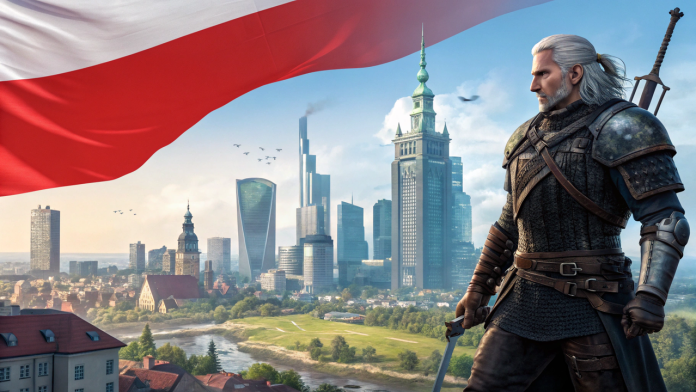The air in Warsaw last week wasn’t just filled with the summer heat; it crackled with the energy of creation, innovation, and digital ambition. The annual “Warsaw Game Dev Fusion 2025,” which concluded on July 14th, was more than just a trade show. It was a powerful statement. Poland, once known primarily as the birthplace of “The Witcher,” is no longer just a player on the global gaming stage; it’s aggressively rewriting the rules of the game. The event showcased a mature, diverse, and incredibly vibrant ecosystem, moving far beyond its fantasy RPG roots to stake its claim across all genres and platforms.
The Heart of the Action: Warsaw Game Dev Fusion 2025
This year’s Fusion was the largest to date, attracting over 20,000 attendees, from major international publishers to venture capitalists scouting for the next big hit. While established giants like CD Projekt Red and Techland offered glimpses into their upcoming projects, the real story was the sheer scale and quality of the broader industry.
- AAA Sophistication: Several major studios unveiled gameplay for highly anticipated titles. Noteworthy was the trend towards “historical fiction tech,” blending Poland’s rich history with sci-fi elements, creating unique game worlds that feel both familiar and fantastical.
- Technological Prowess: Demonstrations focused heavily on next-generation graphics, with native support for advanced ray tracing and AI-driven NPCs that promise unprecedented realism. One studio, “Quantum Forge,” presented a proprietary engine capable of rendering entire cities with photorealistic detail in real-time, a technology they claim will slash development time by 30%.
- Global Networking: For the first time, the Fusion hosted dedicated pavilions for investors from North America and Asia, resulting in an estimated $150 million in on-site investment deals for Polish studios, according to event organizers.
Beyond the Giants: The Unstoppable Rise of Polish Indies
The true pulse of Poland’s gaming heart could be felt in the bustling indie developer section. Hundreds of small, passionate teams showcased games that were innovative, personal, and daring. This creative explosion is no accident; it’s the result of a supportive ecosystem.
A Culture of Support and Collaboration
The Polish government, recognizing the industry’s economic potential, has fostered this growth through various initiatives. The “GameINN” program, for instance, provides grants for R&D in game development. This financial backing, combined with a strong network of university programs churning out skilled artists, programmers, and designers, has created fertile ground for startups. “We’re not just competitors; we’re a community,” says Zofia Nowak, founder of indie studio “Pixel Weavers.” “We share knowledge, we test each other’s games. When one of us succeeds, it lifts all of us up.”
Case Study: “Slavic Echoes” – The Indie Darling
One of the breakout hits of the Fusion was “Slavic Echoes,” a narrative-driven adventure game based on lesser-known Slavic mythology. Developed by a team of just five people, the game captivated players with its stunning hand-drawn art style, haunting soundtrack, and a branching story that explores themes of tradition versus modernity. It secured a major publishing deal on the second day of the event, proving that a unique cultural perspective can be a powerful asset in a crowded market.
Fueling the Future: Investment and Education
The success of the Polish gaming industry is built on a solid foundation of talent and investment. Universities in Warsaw, Kraków, and Wrocław now offer specialized degrees in game development, ensuring a steady stream of talent. Furthermore, the success of past hits has created a virtuous cycle:
- Veteran Spin-offs: Experienced developers from major studios are now leaving to form their own companies, bringing world-class expertise to the startup scene.
- VC Attention: International venture capital firms, once hesitant, now see Poland as a low-risk, high-reward environment for tech investments.
- Infrastructure: The country boasts world-class internet infrastructure and a lower cost of living compared to Western European hubs, making it an attractive base for developers from all over the world.
What’s the Next Level for the Polish Gaming Powerhouse?
Looking ahead, the Polish gaming industry is set to tackle new frontiers. There’s a growing focus on mobile gaming and esports, two massive markets where Polish developers are still gaining a foothold. Additionally, several companies at the Fusion showcased early prototypes for VR and AR experiences, suggesting that the next generation of immersive entertainment could very well be designed in Poland. The legacy of Geralt of Rivia was not an endpoint; it was the spark that ignited a fire. Today, that fire is a blazing inferno of creativity and ambition, poised to leave an indelible mark on the world of interactive entertainment.
Poland has successfully transitioned from a single-hit wonder to a diversified, resilient, and innovative gaming superpower. The combination of creative talent, government support, and a collaborative spirit has created a model for other nations to follow. The question is no longer if Poland will produce another global hit, but how many and how soon.
What Polish game, big or small, has captured your imagination recently? Share your thoughts in the comments below!
